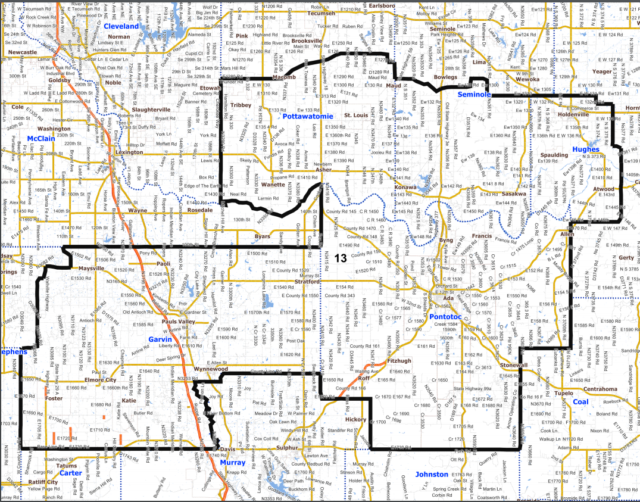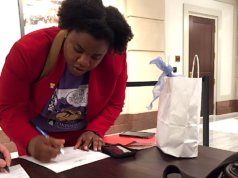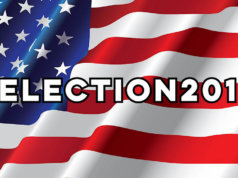
(Editor’s note: Earlier this month, NonDoc emailed questions to more than two-dozen candidates running for various offices. More than half of those sent questions did not respond by the Oct. 20 deadline. The appearance on our site of a candidate’s responses, which have been lightly edited for style and grammar, in no way represents an endorsement from NonDoc.)
In Senate District 13, Democrat nominee Eric Hall will face Republican Greg McCortney in the race for Sen. Susan Paddack’s (D-Ada) seat, which she is vacating because of term limits.
Below, Hall discusses how his education background would augment his term in office if elected. McCortney did not respond to the same questions, or else his answers would be included here as well.
Why are you running for office?
I believe Senate District 13 needs a citizen legislator. I am not a politician, I am an educator, and I understand firsthand the consequences of poor legislation. While I am an educator by profession, I recognize that this election is about far more than education. We have to continue to grow our economy while simultaneously improving our failures to invest in our core services. Those are two topics that cannot be improved through “politics as usual.” We must work across the aisle and bring a divided political system together to meet the needs of the people. I am committed to serving the people of Senate District 13 in the same way that I work to serve the students I work with on a daily basis.
What have you done in the last 10 years that most qualifies you to hold this office?
As a public school educator, I have been on the front lines as many failed education policies have been implemented. I have had to learn how to do more with less due to a series of unfunded mandates that have been handed down from Oklahoma City. Additionally, we are currently facing a fiscal crisis in Oklahoma. These are serious issues to juggle.
Having firsthand knowledge of the consequences of poorly constructed legislation and experience in crafting budgets that function when revenue is scarce have well-prepared me for the challenges I would face if elected.
Resolving our fiscal issues will require a great deal of collaboration between colleagues and stakeholders; these are areas that my career experience has well-prepared me for if I am fortunate enough to serve Senate District 13.
Oklahoma’s education funding has been a topic most relevant this election year. Are you voting for or against State Question 779 on Nov. 8?
It is very concerning to me that questions such as 779 have to be on the ballot. Oklahoma’s best and brightest teachers are choosing to teach in neighboring states or leave the profession entirely. This situation is a result of years of decreasing the priority of education in Oklahoma by our legislature. We have failed to maintain a competitive salary schedule for our professional educators and have crippled the ability of our local school districts to provide the essentials necessary to deliver effective instruction in the classroom. As a result, over 50,000 students in our state are enrolled in classes that are taught by teachers who received emergency certification.
Salaries are not the only issue causing the low morale in the teaching profession that is ultimately causing our teacher shortage, however, increasing salaries is a step in the right direction. I do not believe 779 is a perfect solution; it is not my preference to go to a sales tax increase to fund a salary increase. However, we have passed a crisis point, and we must begin to right the ship. After a great deal of thought, I will vote yes for 779.
Aside from education, what topic are you most passionate about?
It is essential to the future of Oklahoma that we work to create more good-paying jobs in our state. We need to build bridges from public education to the job front. Investing in and protecting public education and health care in our state will promote an educated, healthy workforce, which will improve our local economies and attract jobs to the region.
What is one piece of legislation you are considering filing next year?
In Senate District 13, water is a very important topic. We must continue to monitor and strike a balance between utilization of the natural resource and conservation to ensure that our citizens have access to clean water for generations to come. SB 288 and SB 597 have gone a long way to establish and implement a system for withdraw that promotes long-term sustainability and viability of the resource; however, there are still areas that need to be addressed. This precious resource is not a political game, and we must work collaboratively between the State of Oklahoma and all of the stakeholders involved to create meaningful legislation to protect it.
Sen. Susan Paddack (D-Ada) has served SD 13 for 12 years. Tell voters one policy area where you agreed with her and one policy area where you differ.
I have had the fortune to visit with Sen. Paddack on many occasions, and to answer the question, I’m sure if I reviewed every vote she has made in 12 years there would likely be areas that she and I disagree. That said, through this campaign I have visited with many citizens in Senate District 13, I have had many conversations in which her name came up and all of these discussion have one thing in common: Republican or Democrat, the citizens of this district have a great deal of respect and admiration for Sen. Paddack.
This is a result of 12 years of representing the people of this district, not a political ideal. While it is impossible to cast as many votes as she has in 12 years and have every constituent agree with each vote, she always took the time to visit with and listen to the concerns of her constituents. She has left very big shoes to fill. Her accessibility and transparency have earned her the trust of her constituents. No one can sit in the chair she is vacating and instantly garner the respect and admiration she has earned.
I am inspired by the example she has set and am fully committed to continuing to put people ahead of politics.





















